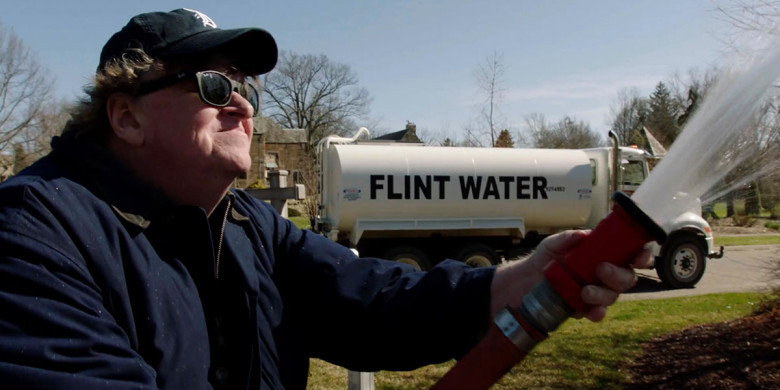Michael Moore Returns with ‘Fahrenheit 11/9’
Documentary Talks Trump Era and Flint Water Crisis

Michael Moore’s latest film Fahrenheit 11/9 is like watching two documentaries rolled into one. The film’s primary thread has already been terrifying moviegoers for months. It dominates the film’s trailer, depicting a democracy in crisis and featuring Moore declaring President Donald Trump “the last President of the United States.” The film picks up this thread at the beginning, retelling the story of Trump’s rise and election from the moment he declared his campaign, which, in Moore’s portrayal, began as a sham publicity stunt because Trump was angry at NBC (how it unnerved the future president when he discovered that Gwen Stefani was better compensated than he was). It then stitches together all-too-familiar news footage of escalating Trump rallies, the surprises of election night (hence the “11/9”), as well as dozens of alarming statements and misstatements by Trump, his family, and members of his administration.
Most of this story will already be well-known to anyone who lives outside the Fox News/Breitbart propaganda silo. Yet Moore’s candid narration does a nice job underscoring, for anyone in doubt, how far and how fast the U.S. has departed from democratic norms in the Trump era. Moore’s credibility on this topic is based upon the fact that he has widely been cited as calling the election for Trump when everyone was convinced Hillary Clinton would triumph. He correctly saw that voters in Mid-Western states were badly neglected if not insulted by the Clinton campaign. Throughout these components of the film, Moore’s narration is equal parts hilarious and frightening, combining ironic storytelling and cartoonish music with deadly serious politics, as the unsettling past two years of American political history unfolds again before our eyes, narrated by one of the left’s most reliable spokespersons.
The other major story told by Fahrenheit 11/9 — and arguably the film’s more significant contribution to the present political conversation — deals specifically with the Flint, Michigan, water crisis. Here, Moore displays impressive investigative journalism, returning to his hometown. Flint was economically devastated by the departure of the auto industry, an earlier crisis that was the subject of Moore’s breakthrough documentary Roger and Me (1989). This time, Moore tells the urgent story of how corporate greed and government corruption brought about dangerous lead contamination in Flint’s water supply, where approximately 10,000 children have been put at risk of serious health problems. Moore shows the disturbing racial dimensions of the present crisis, which he calls a form of “slow-motion ethnic cleansing” against the city’s majority African American population. According to Moore, the project was deliberately coordinated by Michigan Governor Rick Snyder. Snyder’s deceptive “run-Michigan-like-a-business” promises are presented as a prototype for Trump’s “plain sight” lies and dishonesties. Not insignificantly, Moore points out, Trump was the only major presidential candidate to make a visit to Flint, albeit for devious reasons, not least of which was the chance to buddy up with and learn from his crony Snyder.
Throughout this sequence, Moore is at his best as he interviews victims of the water crisis, even confronting Snyder and his administration directly. In one memorable scene, Moore shows up at the Michigan State Capitol to make a citizen’s arrest of the governor, offering Snyder a glass of water he personally transported from Flint. When the governor declines through a nervous representative, Moore brings a full tanker of Flint water to the governor’s mansion and hoses down the driveway.

Given Moore’s status as an outspoken celebrity, it’s hard to imagine that anyone would pay to see Fahrenheit 11/9 without having some preconceived idea of his politics. Moore’s films are well-known to be impassioned rallies for the left, and on this note Fahrenheit 11/9 does not disappoint.
Outside the Flint sequences, the film casts a broad net, describing many dire problems facing America but also highlighting signs of hope. The film covers broadly ranging topics: 9/11 and the public-emergency culture it generated, the scandal and shame of the DNC’s dismissal of Bernie Sanders’ legitimacy, the rise of galvanizing new political figures such as Democratic Socialist Alexandria Ocasio-Cortez, as well as the Parkland, Florida, school shooting (familiar territory for Moore, whose Bowling for Columbine (2002) galvanized the nation) and the March for Our Lives student movement.
In the Santa Barbara theater where I viewed the film, the experience was one of considerable solidarity. Certainly, for those on the left, it feels good to watch Moore replay a speech by Adolf Hitler at a rally from the 1930s, only superimposed with Trump’s voice. Yet the over-broad, often propagandistic elements of this film could alienate some viewers who might otherwise be interested in hearing more about the details of the Flint crisis. If no one seems to walk out of a Michael Moore film offended, that is probably because those who might disagree — as well as those who might feel uncomfortable when presented with any form of highly-persuasive propaganda — are self-selected out of the audience in advance.
Perhaps the most memorable moment of Fahrenheit 11/9 occurs during the Flint sequence, where Moore is at his combative best on behalf of those his investigative journalism serves. When a security officer monitoring a Flint water-rights protest is asked if the protestors have any “weapons,” the man’s candid response could hardly be more perfect: “Michael Moore is here.” The riskiest moment, on the other hand, is a clip from over a decade ago featuring former White House Chief Strategist and terrifying white nationalist Steve Bannon, who calls Moore a “great filmmaker” even though he disagrees with Moore’s politics. When Moore remarks, satirically, that he is not sure what to make of this compliment from Bannon, he undermines his own credibility more than he ought to. In 2018, where media is so often consumed within rigid partisan filter bubbles, propagandists, including Moore — at least when he enters this rhetorical mode — really only preach to the choir. This is unfortunate, because the anger-inducing reporting Moore provides in Fahrenheit 11/9 about criminally impoverished, poisoned Flint should be required viewing for all Americans.



